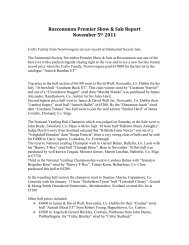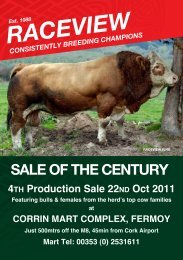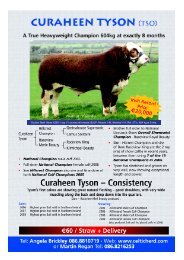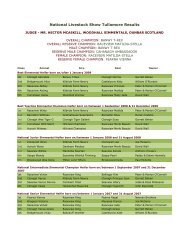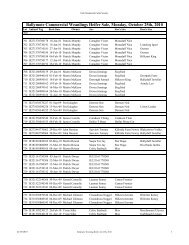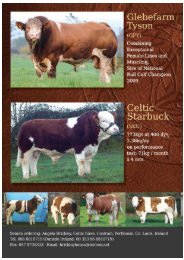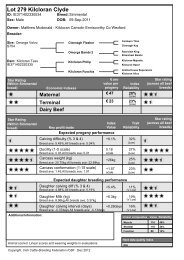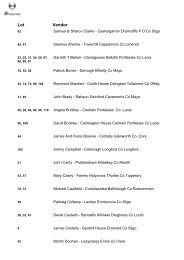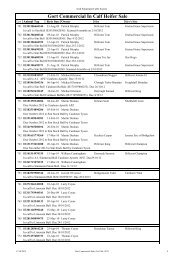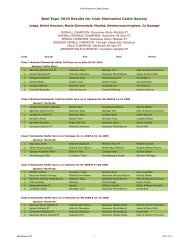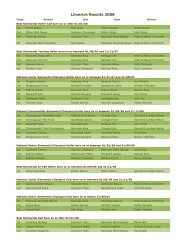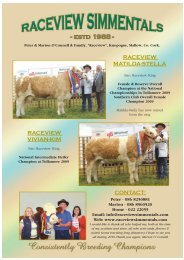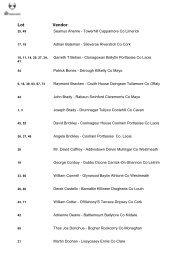Herdbook Regulations 2012 - Irish Simmental Cattle Society
Herdbook Regulations 2012 - Irish Simmental Cattle Society
Herdbook Regulations 2012 - Irish Simmental Cattle Society
You also want an ePaper? Increase the reach of your titles
YUMPU automatically turns print PDFs into web optimized ePapers that Google loves.
IRISH SIMMENTAL CATTLE SOCIETY<br />
CATTLE SOCIETY LTD.<br />
HERDBOOK REGULATIONS<br />
1. <strong>Herdbook</strong> Contents<br />
The <strong>Herdbook</strong> of the <strong>Society</strong> shall include:<br />
a) Particulars of the Pedigree of Registered <strong>Simmental</strong> <strong>Cattle</strong>.<br />
b) Other information as the Council of the <strong>Society</strong> may from time to time decide.<br />
2. Membership<br />
a) Full membership of the <strong>Society</strong> is now confined to people own as least one pedigree <strong>Simmental</strong><br />
animal. Application forms for membership are available from the Societies office.<br />
b) An existing member of the <strong>Society</strong> is required to act as a witness on application for membership.<br />
c) On applying for membership, the new applicant agrees to make all payments to the <strong>Society</strong> via<br />
direct debit.<br />
d) No person who is not a member shall be allowed to register in the <strong>Society</strong>'s herdbook.<br />
e) Members shall co-operate with any inspectors of the <strong>Society</strong> that may call to do random spot<br />
checks etc. from time to time.<br />
3. Eligible Animals<br />
Animals eligible for entry into the <strong>Society</strong>'s <strong>Herdbook</strong> of Pedigree <strong>Simmental</strong> cattle shall be:<br />
a) Animals, whose parents & grandparents are registered or eligible for entry in the <strong>Irish</strong> <strong>Simmental</strong><br />
<strong>Cattle</strong> <strong>Herdbook</strong> or in another recognised herdbook of that breed.<br />
b) Animals that are identified at birth according to the rules of that herd book.<br />
c) Animals, who's pedigree was established in accordance with the rules of that herd book<br />
In addition, animals should be free from undesirable characteristics<br />
4. Herd Prefix or Name<br />
Every member who registers the entry of an animal in the <strong>Society</strong>'s <strong>Herdbook</strong> must register an<br />
approved Herd Prefix, which shall be applicable to all animals bred and registered by that member<br />
either alone or jointly with a partner(s) or other person(s) in any one herd.<br />
(a) A Prefix shall consist of one approved word only with not more than ten letters and a member shall<br />
pay a fee for registration thereof set by the Council.<br />
(b) A Prefix that has been used by a member may not subsequently be used by another member,<br />
except when a herd is taken over by the representative of the family of the previous owner of such<br />
herd. No Prefix may be transferred from one member or herd to another unless special permission<br />
of the Council of the <strong>Society</strong> is obtained.<br />
5. Herd Designation Letters / National Herd ID<br />
As from January 1 st 2004 all herds will be identified in the herdbook using the National ID Herd<br />
Identifier digits. (1 st 7 digits which appear on yellow tag). Therefore on membership application an<br />
applicant must also include National Identifier ID.<br />
This replaces the Herd Designation Letters. However all animals registered under the Letter system<br />
will continue to hold their letters as well as their National ID number.
6. Procedure for <strong>Herdbook</strong> Entry<br />
For all animals born after September 1 st 2003, tattooing is no longer a requirement. These animals will<br />
be identified by their dual National ID numbers.<br />
(a) The entry of every animal in the <strong>Society</strong>'s <strong>Herdbook</strong> must be tendered for registration by the owner<br />
of such animal.<br />
(b) All bulls used for pedigree breeding must be DNA typed by an approved DNA laboratory.<br />
(c) Artificial Insemination - Where calves are born as a result of insemination from a bull registered in<br />
the <strong>Society</strong>'s <strong>Herdbook</strong> or another EU approved <strong>Herdbook</strong> for that breed, the breeder is obliged to<br />
retain the insemination certificate which may be required to be forwarded to the <strong>Society</strong> on a<br />
random insemination certificate spot-check.<br />
(d) Embryo Transfer<br />
(1) Where calves are born as a result of embryo transfer the donor female shall be DNA typed by<br />
the breeder. The <strong>Society</strong> reserves the right to request additional DNA testing at the breeder's<br />
expense if thought necessary.<br />
(2) The recipient female must be recorded on the embryo registration form.<br />
(3) All embryos frozen must be entered on the embryo amendment form.<br />
(4) All completed embryo registration forms must be signed by the approved collection team<br />
that collected the embryos and forwarded to the <strong>Society</strong> with the registration fee set by<br />
Council.<br />
(5) Embryo calves are also registered through Animal Events with both the donor dam and<br />
recipient dams listed.<br />
(6) All ET calves must be parentage verified by DNA before any certificates are issued at the<br />
owners expense.<br />
(7) In the event of a frozen embryo or recipient dam being sold a copy of the relevant embryo<br />
forms must be given to the new owner.<br />
(e) Fees - The Council may from time to time set or make changes in the fees for membership, prefix,<br />
registration (homebred or imported), late notification penalties, embryo registration, export cert<br />
and transfers. The current fees are attached.<br />
(f) The <strong>Society</strong> will issue certificates on receipt of payment or straight away if on direct debit system<br />
once all relevant details in place.<br />
(g) All calves born outside the period 275 to 300 days after the date of insemination/service will be<br />
subject to a DNA test at owner's expense. (regarding any calves over 300 days gestation - the<br />
<strong>Society</strong> reserves the right to inspect and not register where necessary)<br />
(h) The <strong>Society</strong> reserves the right to carry out random DNA typing at the breeder's expense.<br />
7. Semen Royalty Scheme<br />
a) Pedigree calves sired by an approved Semen Royalty Bull will have an additional royalty fee<br />
applied payable by the breeder of the calf<br />
b) Eligible bull – as approved by Council on meeting the agreed approval rules. Entry of bull onto<br />
royalty scheme must be made on official application form. This form clarifies to bull ownership<br />
and allows the ISCS to act as agents to collect royalty fees<br />
c) Fee Collection – Semen royalty fees will be collected by ISCS acting as an agent for the owner of<br />
the pedigree semen rights. The agree collection fee will be retained by the <strong>Society</strong> and the<br />
remained paid to the pedigree semen rights owner yearly at end of year.<br />
d) The <strong>Society</strong> will only collect royalty fees for one pedigree semen rights owner for any bull. Where<br />
a bull is sold the ownership of the royalty rights must be retained in full or sold on in full effected<br />
from date of sale.<br />
e) Any member who refuses to pay a semen royalty fee after final demand has been issued, may at<br />
the decision of Council be barred from conducting any further herdbook business with the <strong>Society</strong>.
Agreement for non payment of royalty fees maybe made between the royalty owner and a member<br />
provided that the details of such an agreement are made available to the ISCS in writing.<br />
f) Females sold in-calf to a royalty bull. The purchaser shall be eligible for the royalty fee where<br />
females are purchased in-calf to a royalty scheme bull.<br />
8. Import / Exports<br />
(a) <strong>Cattle</strong><br />
Each imported animal must be registered with the <strong>Society</strong> by submitting the official <strong>Herdbook</strong><br />
Certificate of the country of origin together with the set fee.<br />
The <strong>Society</strong> will interact with the relevant herdbook to source the required DNA data. Where this data<br />
is not available it will be the responsibility of the breeder to furnish it to the <strong>Society</strong>.<br />
(b) Semen<br />
Where calves are born as a result of insemination / fertilisation with imported semen, registration will<br />
only be accepted provided:<br />
That the sire is approved for use in A.I.<br />
That the conditions in item 6c have been fulfilled.<br />
(c) Embryos<br />
Imported embryos should be registered with the <strong>Society</strong> and the same criteria apply as for home<br />
produced embryos.<br />
(d) Exports of Animals, Embryos, Semen etc.<br />
All exports should comply with the National legislation in place at the time. Where the purchaser<br />
requires an export pedigree certificate, the <strong>Society</strong> will supply same at the fee specified.<br />
9. Naming of Animals<br />
(a) Each animal must be named; the first letter of the name must be that of the correct year letter. For<br />
example the year letter for 2004 is (R).<br />
(b) In the case of imported animals, the year of importation and the initial of the country of origin<br />
must always follow in brackets, the name of the animal.<br />
10. Certificate of Registration<br />
(a) On receipt of the Animal Events, following verification of pedigree data and on meeting payment<br />
criteria the <strong>Society</strong> will issue a Pedigree Certificate. In the event that it is found necessary to<br />
withdraw a certificate of registration, no refund of fees will be made. The breeder may appeal this<br />
decision in writing whereupon a special inspection shall be arranged by the <strong>Society</strong>. The <strong>Society</strong>'s<br />
decision will be final.<br />
(b) In the case of an animal which has been registered and subsequently is shown to be the carrier of<br />
undesirable characteristics, in the opinion of the Council, then no progeny of this animal will be<br />
eligible for entry into the <strong>Herdbook</strong> and the certification of registration must be returned to the<br />
<strong>Society</strong>.<br />
(c) A programme of Linear Scoring, Weight Recording and performance testing may be operated in<br />
conjunction with the official body. Such data may be entered on the <strong>Herdbook</strong> certificate as<br />
decided by Council.<br />
Members are encouraged to join the <strong>Simmental</strong> Quality Development Scheme which includes<br />
Linear Scoring, Weight Recording and the use of Tully Bull Testing Station.<br />
(d) Transfer fee for breeding females will be collected on registration of first calf or on first calf<br />
within herd in the case of older females.<br />
11. <strong>Society</strong> / National Show Classes: All breeders wishing to enter animals in <strong>Society</strong> Sales &<br />
National show Classes must participate in Linear Scoring and Weight Recording.
12. Appeals: All appeals will be dealt with in accordance with the procedures detailed at Appendix 1.<br />
Fee Structure<br />
Category<br />
Euro Fee<br />
Annual Membership Fee €50<br />
Life Membership €510<br />
Club Fee €13<br />
Prefix Registration Fee €100 New Member<br />
Animal Registration Fee €54 Home Bred or Imported<br />
Animal Registration Fee (Cash) €60 Home Bred or Imported<br />
Female Transfer €50 Home Bred or Imported<br />
Administration Fee €50 New Pedigree Into <strong>Herdbook</strong><br />
Embryo Registration Fee €7<br />
Export Certificate €30<br />
Female Deregistration €45 Credit Female Under Two Years<br />
A DNA Sample is require to be processed through Wetherby's (at the expense of the Breeder<br />
seeking registration) on all new SIRE'S entering into the <strong>Herdbook</strong>.<br />
Calves with gestation lengths of over 300 days will have to be DNA typed at the breeder's<br />
expense.<br />
Yearly Membership: Please note that your Yearly Membership of 50 euro (Life Member 13<br />
euro) is due January 1 st of Each Year.<br />
Late Registration Fees / Procedure: All calves must be registered within 30 days<br />
of birth to fall under the normal registration fee. However calves can be<br />
registered up to 150 days after the standard 30 days (i.e. 6 months old) through<br />
Animal Events, with the following fees applying:<br />
31 - 60 Days of Age +€15<br />
61 - 90 Days of Age +€30<br />
91 - 180 Days of Age +€2 per Day up to €300 + DNA at owner’s expense.<br />
Members wishing to register animals over 180 days of age (i.e. 6 months) must<br />
apply to the <strong>Society</strong> Office for Council attention. The fee for all animals over 180<br />
days is as follows:<br />
Between 180days and 2 years €350 + DNA at owners expense<br />
Over 2 years €500 + DNA at owners expense.<br />
If the Member applying to register an animal is other than the breeder, then the<br />
registration application must be accompanied by a letter of consent from the<br />
original breeder or a DNA profile from the dam of the animal seeking<br />
registration and forwarded to the <strong>Society</strong> Office with registration application.<br />
De-registration: A breeder may choose to deregister a calf after registration. Should a<br />
breeder or subsequent owner choose to reregister the calf at a later date, the calf may<br />
be registered under the same conditions as a late registration i.e. incur a late<br />
registration fee and must be DNA typed at the breeder/owners expense<br />
If the Member applying to re-register an animal is other than the breeder,<br />
then the re-registration application must be accompanied by a letter of<br />
consent from the original breeder or a DNA profile from the dam of the<br />
animal seeking registration and forwarded to the <strong>Society</strong> Office for Council<br />
attention.
APPENDIX 1<br />
APPEALS PROCEDURE<br />
The objective of this procedure is to provide a member who has a grievance with the<br />
society an opportunity to have the grievance examined and resolved at the earliest<br />
practical moment and at the most local level possible.<br />
While the matter is being considered under the Appeals Procedure, the operation of<br />
the <strong>Society</strong> cannot be interrupted. The person(s) raising the matter shall continue to<br />
comply with the rules of the <strong>Society</strong> during the course of the examination of the<br />
matter in question. By so doing he/she will not create any precedent nor will his/her<br />
membership of the <strong>Society</strong> be prejudiced in any way in relation to the matter being<br />
processed.<br />
The procedure to apply shall be as follows:<br />
Stage 1<br />
A member who feels aggrieved in relation to any matter pertaining to <strong>Society</strong><br />
business should, in the first instance, write to the Chairman of the Council of the<br />
<strong>Society</strong>, making it clear that Stage 1 of the Appeals Procedure is being invoked. The<br />
Chairman will reply as soon as is reasonably practicable, but in any case within thirty<br />
days from receipt of the letter from the appellant.<br />
Stage 2<br />
If the grievance is not resolved at Stage 1, or if a reply is not forthcoming from the<br />
Council Chairman within thirty days, the member(s) may request in writing, that at<br />
their next Council meeting, the Council allow the member(s) to attend the meeting<br />
during the period that the grievance is being considered. The member(s) will be<br />
allowed to make an oral submission on the grievance. The Council will then<br />
reconsider the issue and must communicate its decision to the appellant within thirty<br />
days.<br />
Stage 3<br />
If the issue remains unresolved after Stage 2, the member(s) may request an<br />
independent hearing. The Council shall grant such a hearing. Appeals at Stage 3 will<br />
be heard by an individual or group of individuals with appropriate expertise, agreed<br />
by both parties to the dispute. From the date of appointment of the person(s) hearing<br />
the appeal, the case will be heard and the decision taken will be communicated to both<br />
parties within three months. The person(s) hearing the case will decide on the<br />
apportionment of costs, as appropriate.<br />
Stage 4<br />
Any dispute that remains unresolved after Stage 3 may be pursued by invoking<br />
provisions under the legal personality of the <strong>Society</strong>: ICOS Rules or the 1963<br />
Companies Act.<br />
All breeders shall abide by the <strong>Society</strong> Rules.



